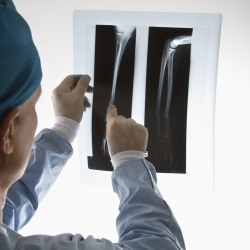 The world health organisation defines palliative care as “an approach that improves the quality of life of patients and their families facing the problem associated with life-threatening illness, through the prevention and relief of suffering by means of early identification and impeccable assessment and treatment of pain and other problems, physical, psychosocial and spiritual.”
The world health organisation defines palliative care as “an approach that improves the quality of life of patients and their families facing the problem associated with life-threatening illness, through the prevention and relief of suffering by means of early identification and impeccable assessment and treatment of pain and other problems, physical, psychosocial and spiritual.”
In the hospital and acute setting palliative care physicians work with teams of specialist palliative care nurses. Their role is to advise nursing and medical teams on complex symptom control, psychological and spiritual issues for people with life limiting illnesses.
Palliative medicine physicians work closely with a variety of colleagues including those in general practice, medical and clinical oncology and other medical and surgical specialities. Consultants who also work in hospices are involved in the day to day care of patients admitted for symptom control, and end of life care.
A typical working week might include:
- MDT meeting with hospital team to discuss all new referrals seen by clinical nurse specialists.
- Joint visits with hospital palliative care clinical nurse specialist to see patients on wards with specialist palliative care needs. This would involve liaising with the nursing and medical team to alter medication, discussion where appropriate with allied health care professionals as well hand over to community services.
- Meeting with different medical teams to discuss implementing best prescribing.
- Time reading journals to aid development of local guidelines for prescribing at the end of life.
- Home visits with community specialist palliative care clinical nurses, sometimes followed by visits to GP surgeries to discus future care options.
- Teaching session for junior doctors in acute trust on symptom control and principles of a good death.
The speciality attracts people who enjoy working in a multi-professional team and are able to deal with uncertainty. There is a good mix of clinical work and opportunities to practice and develop clinical skills and judgement. Since it is a relatively new speciality there are many opportunities to develop a varied and changing career. A consultant is often involved in strategy, development and shaping of services.
The work is varied, challenging, people centred and team orientated, however it can be extremely busy and sometimes it feel over whelming, so an ability to prioritise and deal with difficult circumstances is important.
Many consultants work part time, and most across sectors. On call is usually from home, sometimes including on call for a hospice depending on the area. Flexible working is well supported and some consultants have specialist interests such as research, renal disease or education. Some non-consultant career grade doctors combine practice in palliative medicine with part-time work in General Practice. There is currently quite a small evidence base for palliative medicine and hence ample scope for research.
The typical pathway into palliative medicine is either MRCP or MRCGP then applying for speciality training although other routes are possible so seeking advice from local palliative medicine consultants as well as looking at relevant speciality websites such as those detailed below will prove useful.
Case study: Consultant in Palliative Medicine, Anna Lock

The work is varied and I really enjoy the variety of working across acute and community sectors, the challenge is to keep track of whereI’m meant to be!
Palliative medicine in certainly an expanding speciality. The national recognition that death is everyone’s business has put the spot light on our speciality giving us a fantastic opportunity to influence policies to improve palliation for large number of people with life limiting diagnosis. Additionally as a small speciality we are increasingly delivering education to help generalists deliver good supportive and palliative care where ever patients are alongside our own clinical practice.
My advice to someone considering palliative medicine would be to spend some time with their local specialist palliative care team to see what they do and whether this might be for them.
It is an immensely satisfying career. I would do the same if I had the opportunity to do it all over again.”
Additonal Sources of Information:
http://www.jrcptb.org.uk/specialties/st3-spr/Pages/Palliative-Medicine.aspx
http://www.rcplondon.ac.uk/specialties/Palliative-Medicine/Pages/Palliative-Medicine.aspx



